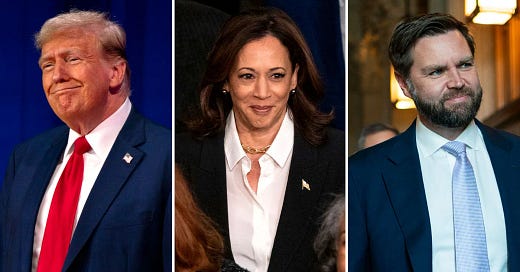Kamala Harris has changed her mind about fracking and immigration (among other things). Donald Trump has changed his mind about TikTok and corporate tax breaks (among other things). And JD Vance has changed his mind about Donald Trump. Welcome to the opportunism election.
Don’t get me wrong. Flexibility in politics is a virtue, not only as a matter of intellectual suppleness—as the wise Ralph Waldo Emerson famously said, “a foolish consistency is a hobgoblin of little minds”—and electoral acumen. Still, the politicians we tend to admire most are those we regard as people of conviction, whether Ronald Reagan or Bernie Sanders. (Though even they have their exceptions; see, for example, Sanders’s tap dance on gun control as the representative of a rural state.) The political gold standard is those who take firm stands that are unpopular even with their own base, as with Mario Cuomo’s opposition to the death penalty or Gerald Ford’s pardon of Richard Nixon. But integrity has a price. The art of politics is a matter of minimizing it.
What seems most notable to me about the 2024 election is the degree to which no candidate is really willing to embrace positions that majorities of American voters actually want. Some limits on gun ownership. Some limits on abortion rights. Better child care support for families. Restrictions on corporate power, particularly in tech and health care. The candidates generally can’t do this because they are beholden to political and financial minorities on the margin.
Ironically, the purest candidate in American politics is Donald Trump, because his positions are always a matter of what’s best for Donald Trump. A pledge to overturn Roe v. Wade played a major role in getting him elected, and once he did that, he tacked back the other way for transparent reasons. In one of the very few instances where Trump has spoken out in the face of boos, he told a crowd in Nashville last week that he supported legal abortions in the case of rape, incest, or the life of the mother because “You do have to win elections. If you don’t do certain things, you’re not going to win elections, and it will be a very Pyrrhic victory — it’ll be a victory that’s not really a victory at all.” Harris, for her part, seems to be on a journey from tough-on-crime to defunding the police and back. She’d surely agree with Trump’s logic even as she’d never say so—though it sometimes seems unclear what she actually does think.
I continue to believe that there’s a large and fluid chunk of the electorate waiting to be seized by someone with the skill and courage to forge a new majoritarian coalition of the kind the Democrats largely captured in the middle third of the twentieth century and the Republicans largely held for the rest of it. But the arrival of such a figure is not imminent, and that person’s prospects are uncertain because the fate of the republic itself is uncertain. But as is true in so many other aspects of everyday life, to live is to hope.



